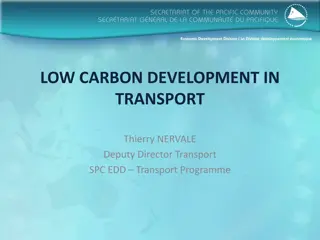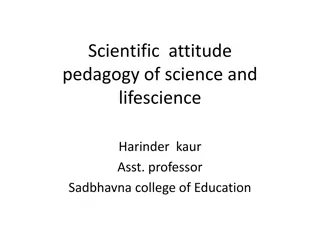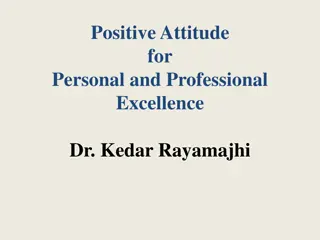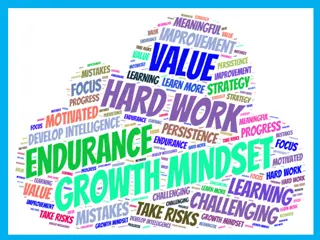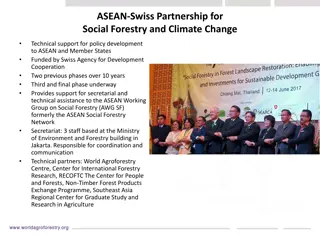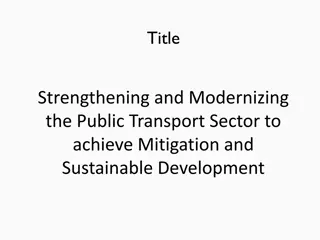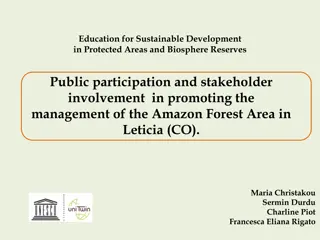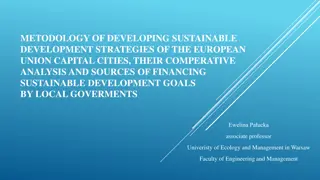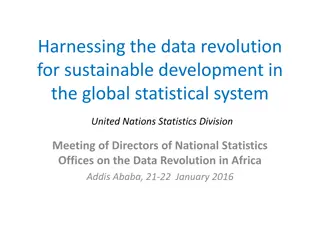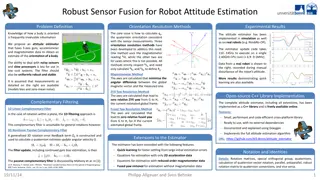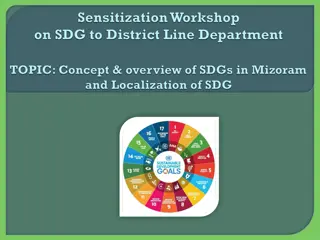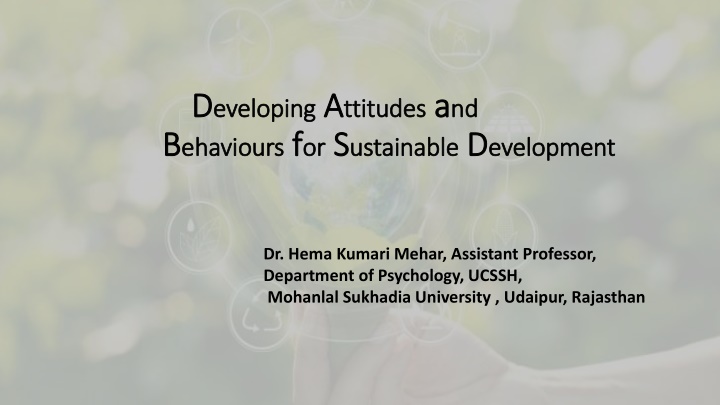
Sustainable Development: Attitudes and Behaviors for a Better Future
Explore the importance of sustainable development and the role of human values, attitudes, and behaviors in creating a more sustainable world. Learn about the goals, objectives, and psychology behind sustainable actions for a healthier environment and future generations.
Download Presentation

Please find below an Image/Link to download the presentation.
The content on the website is provided AS IS for your information and personal use only. It may not be sold, licensed, or shared on other websites without obtaining consent from the author. If you encounter any issues during the download, it is possible that the publisher has removed the file from their server.
You are allowed to download the files provided on this website for personal or commercial use, subject to the condition that they are used lawfully. All files are the property of their respective owners.
The content on the website is provided AS IS for your information and personal use only. It may not be sold, licensed, or shared on other websites without obtaining consent from the author.
E N D
Presentation Transcript
D Developing eveloping A Attitudes B Behaviours ehaviours f for or S Sustainable ttitudes a and ustainable D Development nd evelopment Dr. Hema Kumari Mehar, Assistant Professor, Department of Psychology, UCSSH, Mohanlal Sukhadia University , Udaipur, Rajasthan
INTRODUCTION INTRODUCTION Most advocates of sustainable development recognize the need for changes in: Human values, Attitudes and Behaviors In order to achieve a sustainability transition that will meet human needs and reduce hunger and poverty while maintaining the life support systems of the planet
What What is Sustainable Development? is Sustainable Development? The psychology of sustainability and sustainable development is thus focused on different environments from the natural environment, the personal environment, the social environment, the organizational environment, and the inter-organizational environment, to the globalized environment and the virtual environment. Human behavior underlies almost all environmental problems, such as air and water pollution, climate change, deforestation, and loss of biodiversity. Research in psychology offers clues as to why people engage in unsustainable behaviors despite their concern about the broader consequences. At the same time, the research also explains why people go out of their way to behave sustainably, and how it is possible to motivate and empower sustainable actions. The goal of the psychology of sustainable behavior is to create the conditions that make sustainable action the most appealing or natural choice.
Objective of Sustainable Development To provide the economic well being to the present and future generation. To maintain a healthy environment and life support system.
Goals of Sustainable Development The 17 SDGs are Sustainable Development Goals (1) No Poverty (2) Zero Hunger (3) Good Health and Well-being (4) Quality Education (5) Gender Equality (6) Clean Water and Sanitation (7)Affordable and Clean Energy
(8) Decent Work and Economic Growth (9) Industry, Innovation and Infrastructure (10) Reducing Inequality (11) Sustainable Cities and Communities (12) Responsible Consumption and Production (13) Climate Action (14) Life Below Water (15) Life On Land (16) Peace, Justice, and Strong Institutions (17) Partnerships for the Goals
Attitude Formation An attitude is a general and lasting positive or negative opinion or feeling about some person, object, or issue. Attitude formation occurs through either direct experience or the persuasion of others or the media. Attitudes have three foundations: affect or emotion, behavior, and cognitions.
Theories of Attitude Formation 3 theories in Attitude formation :- 1. Cognitive-Consistency Theories 2. Functional Theories 3. Social Judgment Theories
What are sustainable attitudes? Attitude change towards sustainable development (SD) may be defined as a change in one's feelings towards the issues related to environment, society, or economy.It is about developing a concern and feeling for the planet earth and life on it.
Pro- Environmental Behaviour Pro-environmental behavior, also known as green-, sustainable-, or environmentally-friendly (eco- friendly) behavior, is defined as behaviors in which individuals take protective actions toward the environment. PEBs include responsibly engaging with outdoors or recycling household waste and recycling but also can be adaptive responses to the impact of climate change such as purchasing sustainable products (e.g., local food, green cleaning products), conserving water or energy, or changing travel modes (e.g., from driving to walking or cycling) to buying an electric vehicle or building an off-grid home.
Barriers to pro-environmental behaviour Pro-environmental behaviour is behaviour that a person consciously chooses in order to minimize the negative impact of their actions on the environment. Barriers to pro-environmental behaviour are the numerous factors that hinder individuals when they try to adjust their behaviours toward living more sustainable lifestyles. Generally, these barriers can be separated into larger categories: psychological, social/cultural, financial and structural.
Internal/psychological barriers A known researcher in the field, environmental psychologist Robert Gifford, has identified 33 of these barriers, barriers that he has termed The Dragons of Inaction. The Dragons are separated into seven categories: Limited Cognition Ideologies Social Comparison Sunk Costs Discredence Perceived Risks Limited Behaviour.
Contextual barriers Social and cultural factors People with diverse cultural backgrounds have different perspectives and priorities, and thus, they may respond to the same policies and interventions in different ways with regionally differentiated world views playing an important role. People are social beings who respond to group norms: behaviour and decision-making has been shown to be affected by social norms and contexts. Demographic variables like age, gender and education, can have a variety of effects on pro- environmental behaviour, depending on the issue and context. However, when considering the effects of socio-demographics on individual perceptions of climate change, a recent study reported a meta-analysis which found that the largest demographic correlation with the belief of human-caused climate change is political affiliation.
Economic Factors The cost of sustainable alternatives and financial measures used to support new technologies can also be a barrier to pro-environmental behaviour. Households may have severe budgetary constraints that discourage them from investing in energy-efficient measures. In addition, individuals may fear that project costs will not be recovered prior to a future sale of a property. In other cases however, environment-friendly behaviours may be undertaken for non- environmental reasons, such as to save money or to improve health (e.g. biking or walking instead of driving).
Structural barriers Structural barriers are large-scale systemic barriers that may be perceived as being objective and external,and can be highly influential and near impossible to control, even when one wishes to adopt more pro-environmental behaviour. For example, lack of organizational and governmental action on sustainability is considered a barrier for individuals looking to participate in sustainable practices. Further examples of structural barriers include: low problem awareness at the local level caused by a low priority for adaptation at higher institutional levels, and missing leadership by certain key actors leading to an absence of appropriate decision-making routines. Other structural barriers reported from a Vancouver-based study include: term limits imposed on politicians that affect council's ability to make long-term decisions; budgetary cycles that force planning based on three year terms, rather than long-term planning; and hierarchical systems that inhibit flexibility and innovation
Reference Gifford, Robert (2011). "The dragons of inaction: Psychological barriers that limit climate change mitigation and adaptation". American Psychologist. 66 (4): 290 302. doi:10.1037/a0023566. ISSN 1935- 990X. PMID 21553954 https://en.wikipedia.org/wiki/Barriers_to_pro-environmental_behaviour https://www.futurelearn.com/info/courses/achieving-sustainable- development/0/steps/35494 https://link.springer.com/referenceworkentry/10.1007%2F978-3-319- 63951-2_160-1



